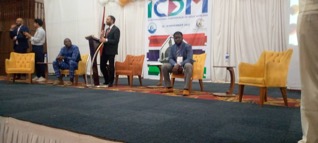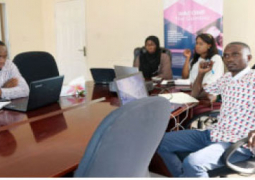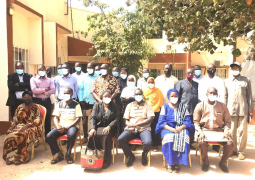
The event was organised by the Global Deaf Muslim Federation (GDMF) in collaboration with the Association of Deaf Muslims Gambia (ADMG) and the Government of the Gambia.
The event, which attracted 150 delegates from 25 different countries, was held on the theme “Deaf Muslims, Social Media and Technology.”
At the event, His Excellency Rashad Hussain, U.S. Ambassador for International Religious Freedom, acknowledged said that faith and religion can overcome differences or build bridges between people of different nationalities, ethnicities, languages and abilities.
While pointing out that disability is not a social barrier, Ambassador Hussain equally noted that challenges of access and discrimination that persons with disabilities encounter are critical issues.
Ambassador Hussain noted that persons with disabilities are excluded from religious communities, sites and services or are treated as objects of charity instead of people whom governments and society, including faith leaders should treat equitably.
The equal and meaningful inclusion of all, Ambassador Hussain stressed, is critical to real progress in advocating for freedom of religion or belief.
On his part, Nashiru Abdulai, president of the Global Deaf Muslim Federation highlighted the importance of verifying information first before sharing on social messaging app -WhatsApp and other social media platforms, citing the need to share only what is accurate and useful to the Ummah.
The president Abdulai, who leads a federation of 35 national Muslim Deaf organisations, equally called for the vigilance on social media platforms as they are increasingly being used to share hate speech and radicalise people around the world.
He called for a comprehensive approach to fight against hate within communities and advised Muslims to revert to the Quran and authentic traditions of the Holy Prophet Muhammad SAW in matters of ‘Deen’ that they don’t understand.
He also urged Muslims to seek these from the right people as opposed to believing whatever they see on social media.
Abdou Kadir Drammeh, president of the Association of Deaf Muslims Gambia, reminded that said that for deaf Muslims to be able to practice their religion, they will need to understand the concept of monotheism, establish the five daily prayers and embody Islamic values that make a good believer.
“Whereas non-deaf Muslims can turn to many sources for their Islamic education,” he said
The experience faced by Deaf Muslims, he added, is rather different due to the limited availability of sign language interpreters as well as the near total absence of Islamic teachers versed in sign language.
“Deaf Muslims in the country are limited to learning Islam through their social circles or from information on the internet. Both sources of Islamic knowledge may often include personal biases that make the Deaf community vulnerable to misinformation and misinterpretation.”
Five deaf persons, including 4 females and 1 male, were inspired to convert to Islam during the confab.




